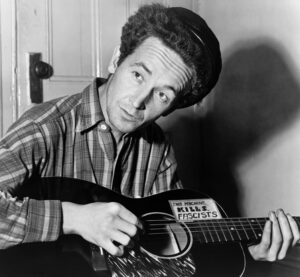
At the intersection of Reconciliation Way and Boston Avenue in the Tulsa Arts District stands a brick building with a multistory, painted mural at its corner. “This Land Is Your Land” is written at the top, and amid painted rays of sunshine and birds is the silhouette of the man who wrote that anthem, Woody Guthrie. He sits profile, his hands positioned to pluck the strings of an acoustic guitar. Across the instrument’s body is a small sign, “This Machine Kills Fascists.”
The decision by the Woody Guthrie Center to include Guthrie’s famous guitar in their mural speaks to how indelible an image it is. The catchphrase, “This Machine Kills Fascists” was so potent an advertisement for Guthrie’s beliefs and messaging that it remains in use decades later by bands, brands, and activists. But as with “This Land Is Your Land,” its original intention has been both debated and co-opted since its inception. What were Guthrie’s political beliefs regarding the fight against fascism? How do we understand his most iconic phrase within the biography of a complicated, often contradictory man?
In an interview with the podcast “The Road to Now,” Woody Guthrie Center’s executive director and chief curator Deana McCloud noted that the famous slogan wasn’t Guthrie’s to begin with. “He borrowed it, as was his style. It was a slogan that was being stamped on war machinery. And he saw it, and his thinking was, ‘Well, my instruments are my machine. My instruments are the way that I fight against fascism.’”
As Guthrie wrote in 1947 in one of his copious diaries:
My guitar is anti fascist [sic]
It breaks down hate
But I felt lots of times
like I hate something
I guess I hate hate
In some photos, his guitar is painted with the slogan in bold letters; in others, a small note with the phrase is affixed to the guitar. But Guthrie wasn’t one for material nostalgia. He slung guitars over his shoulder without the added protection of cases, and often abandoned them during his travels. But each time a guitar was replaced, it appears the slogan would also be stuck onto the new instrument, indicating its importance to both the artist and his mission.
Guthrie’s trajectory to an anti-fascist, sloganeering folk hero was more nuanced than the modern-day heroism of his legacy may indicate. His father, Charley Guthrie, was a real estate businessman who denounced socialists, of which their native Oklahoma had a progressive amount during the Dust Bowl years. He was also a member of the Ku Klux Klan, whom his son sought to distance himself. Despite Woody Guthrie’s mythological associations with Communism and socialism, Guthrie was never an enrolled member of the political parties. As the Woody Guthrie Center put it, “He called himself a ‘commonist’ who supported the common people. In his own words, ‘Left wing, right wing, chicken wing … it don’t make no difference to me.’”
What did make a difference in Guthrie’s life, and what compelled him to utilize his guitar as a political object, was World War II. As Scott Borchert noted in “Woody Guthrie: Redder Than Remembered” in the Monthly Review, “Guthrie was deeply shaken by Nazi atrocities and haunted by a vision of his loved ones in chains, or worse. Guthrie believed that the first task of the artist – musical or otherwise – was to ‘root out, expose, and kill out the fascist enemy everywhere, at home and abroad.’” Guthrie felt these beliefs so strongly that he enlisted in the Merchant Marines, which is likely where he was exposed to the wartime, morale-boosting slogan being stamped on American machinery. After the war, Guthrie focused on making explicit the connections between racism, fascism, and capitalism.
While Guthrie was known to have left or given away hundreds of guitars, his instruments were not frivolous. As Dave Hunter noted in Ultimate Star Guitars: The Guitars That Rocked the World, “Guthrie usually played high-quality guitars, mainly a Gibson banner-headstock Southerner Jumbo and various Martins, although closer examination usually reveals that they were the more affordable examples of the Martin breed: smaller-bodied 0, 00, and 000 models with the simple woods and trim of the 18 series. … One thing is for certain though: whatever size and model Guthrie was playing, it had to be wearing his slogan, ‘This Machine Kills Fascists,’ which he often painted right onto the top of the guitar.”
The use of slogans proved contagious. Guthrie’s frequent collaborator, Pete Seeger, also painted his instruments. Seeger’s banjos read, “This machine surrounds hate and forces it to surrender.”
These “antifascist” guitars are now lost to time. Only two authenticated Guthrie guitars are available for public view: one at the Experience Music Project in Seattle, the other via a private collector who often loans it out to the Grammy Museum in Los Angeles. Neither are plastered with Guthrie’s borrowed saying.
But Guthrie’s notion continues to saturate our media as anti-fascist action spreads across the United States. As with “This Land Is Your Land,” whose frequently skipped final verses are much more explicit in their “warning … to all the bosses and fascists out there who would deny our collective aspirations,” Borchert notes, so too is “This Machine Kills Fascists” often removed from its urgency. Whether facing down union-busters, racists, or Nazi sympathizers, the guitar with that slogan was wielded as an unapologetic weapon to defeat those forces.
About Sarah Weber
Sarah is a New York-based writer and researcher who has lived in the city since 2002, when she arrived from Cooperstown, NY, for her undergraduate studies in music history and photography. She is in her first year in the Biography & Memoir program at CUNY’s Graduate Center, with a focus on biography. While working full-time at Viacom Media Networks, Sarah also hosts a weekly music show for a community radio station in Brooklyn.
Her work is on pairing life writing with music history, specifically how in telling the stories of artists within our musical history, one can illuminate patterns within the sociology of America.
Sources
Borchert, Scott. “Woody Guthrie: Redder than Remembered.” Monthly Review: An Independent Socialist Magazine, vol. 63, no. 1, May 2011, pp. 53–61.
Carr, Nicholas. “‘They Have Their Music and We Have Ours’: The Political Woody Guthrie.” Popular Music & Society, vol. 42, no. 3, July 2019, pp. 309–329.
“FAQ – Woody Guthrie Center.” Woody Guthrie Center, https://woodyguthriecenter.org/about/faq/ Accessed 01 June 2021.
Hunter, Dave. Ultimate Star Guitars: The Guitars That Rocked the World, Expanded Edition. Voyageur Press, 2017.
Jones, Josh. “The Powerful Messages That Woody Guthrie & Pete Seeger Inscribed on Their Guitar and Banjo: ‘This Machine Kills Fascists’ and ‘This Machine Surrounds Hate and Forces It to Surrender.’” OpenCulture.com, 29 August 2017. https://www.openculture.com/2017/08/the-powerful-messages-inscribed-on-woody-guthrie-pete-seegers-guitar-banjo.html
Merchant, Brian. “Can Woody Guthrie’s Machine Still Kill Fascists?” VICE.com, 19 July 2012. https://www.vice.com/en/article/788e4z/can-woody-guthrie-s-machine-still-kill-fascists
Santelli, Robert, and Davidson, Emily, eds. Hard Travelin’: The Life and Legacy of Woody Guthrie. Wesleyan University Press, 1999.
Santelli, Robert. This Land Is Your Land: Woody Guthrie and the Journey of an American Folk Song. Running Press Book Publishers, 2012.
“This Episode Kills Fascists: The Life and Legacy of Woody Guthrie (Promo Video).” YouTube, uploaded by The Road to Now, 01 May 2018, https://www.youtube.com/watch?v=X7Jt_Nd96AY .
Whiteside, Jonny. “Little Known Fact: Woody Guthrie Was a Big Ol’ Racist.” LA Weekly, 13 July 2012. https://www.laweekly.com/little-known-fact-woody-guthrie-was-a-big-ol-racist/


